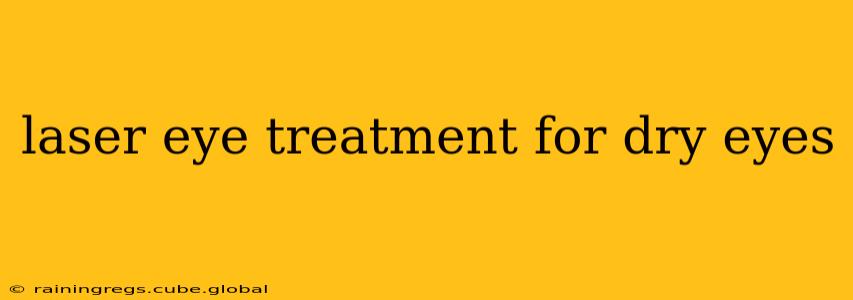Dry eyes are a common condition affecting millions, causing discomfort, irritation, and even vision problems. While many treatments exist, some individuals explore laser eye treatment as a potential solution. However, it's crucial to understand that laser eye surgery itself doesn't directly treat dry eyes. Instead, certain laser procedures might indirectly impact dryness or be considered alongside other dry eye treatments. Let's delve deeper into this nuanced relationship.
What Causes Dry Eyes?
Before exploring the role of laser procedures, it's important to understand the root causes of dry eyes. Dry eye disease occurs when your eyes don't produce enough tears or when the tears evaporate too quickly. This can be due to various factors including:
- Age: Tear production naturally decreases with age.
- Medical conditions: Conditions like Sjögren's syndrome, rheumatoid arthritis, and lupus can affect tear production.
- Medications: Certain medications, including antihistamines and antidepressants, can contribute to dry eyes.
- Environmental factors: Dry air, wind, and sun exposure can accelerate tear evaporation.
- Lifestyle factors: Prolonged screen time, inadequate sleep, and contact lens wear can also play a role.
Understanding the underlying cause is crucial in determining the best course of treatment.
Can Laser Eye Surgery Help with Dry Eyes?
Laser eye surgery, primarily known for correcting refractive errors like nearsightedness, farsightedness, and astigmatism, doesn't directly treat dry eyes. Procedures like LASIK, PRK, and SMILE reshape the cornea to improve vision. While these procedures don't address tear production or evaporation, some patients report changes in their dry eye symptoms post-surgery.
These changes can be both positive and negative. Some individuals find their dry eyes improve after laser vision correction, possibly because the procedure alters the tear film dynamics. Others, however, may experience worsened dry eye symptoms due to the surgical disruption of corneal nerves responsible for tear production and stability.
Does Laser Eye Surgery Make Dry Eyes Worse?
This is a common concern. While laser eye surgery doesn't directly cause dry eyes, it can potentially exacerbate existing dryness or trigger new symptoms in susceptible individuals. The surgical procedure itself, particularly the creation of a corneal flap in LASIK, can temporarily disrupt the corneal nerve supply, affecting tear production and stability. This usually resolves over time, but some individuals might experience persistent dryness.
What Laser Procedures Might Indirectly Influence Dry Eye Symptoms?
Some laser procedures target specific aspects of the eye that could indirectly improve dry eye symptoms in certain cases, but they are not primarily aimed at treating dry eye disease itself:
-
Lipiflow: This thermal pulsation system targets the meibomian glands, which are responsible for producing the oily layer of the tear film. Blockages in these glands can contribute to dry eyes, and Lipiflow helps to clear these blockages. This is a non-surgical procedure, but uses laser technology.
-
IPL (Intense Pulsed Light) Therapy: IPL therapy can help improve the function of the meibomian glands. Similar to Lipiflow, it addresses the oily layer of tears.
What are the Best Treatments for Dry Eyes?
Effective dry eye management involves a multifaceted approach addressing the underlying cause and symptoms. Treatments may include:
- Artificial tears: Over-the-counter lubricating eye drops provide temporary relief.
- Prescription eye drops: These may contain cyclosporine or other medications to stimulate tear production.
- Punctal plugs: These small devices are inserted into the tear ducts to reduce tear drainage.
- Warm compresses: Applying warm compresses to the eyelids helps to express the meibomian glands.
- Lid hygiene: Regularly cleaning the eyelids removes debris and bacteria that can contribute to inflammation.
Can I Get Laser Eye Surgery if I Have Dry Eyes?
Whether you're a suitable candidate for laser eye surgery with pre-existing dry eyes depends on several factors. Your ophthalmologist will conduct a thorough evaluation to assess the severity of your dry eyes and determine if laser surgery is safe and appropriate. If your dry eyes are severe, you might need to address them first before considering laser eye surgery.
Conclusion:
Laser eye surgery is not a treatment for dry eyes. While some individuals might experience improved or worsened symptoms post-surgery, it's crucial to understand that the procedure primarily focuses on vision correction. Individuals considering laser eye surgery should discuss their dry eye condition thoroughly with their ophthalmologist to assess the risks and benefits and explore alternative or complementary treatment options for their dry eyes. Remember, effective dry eye management often requires a comprehensive approach tailored to individual needs.
